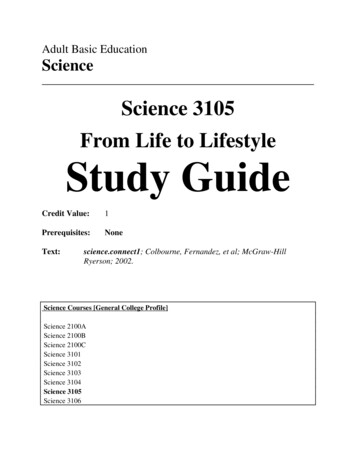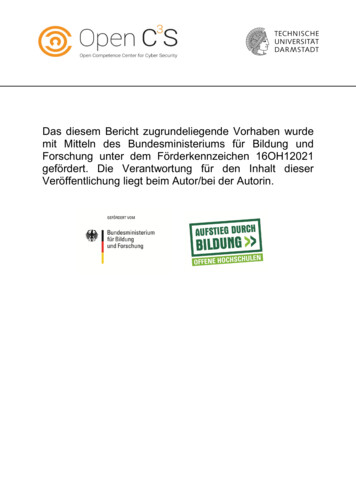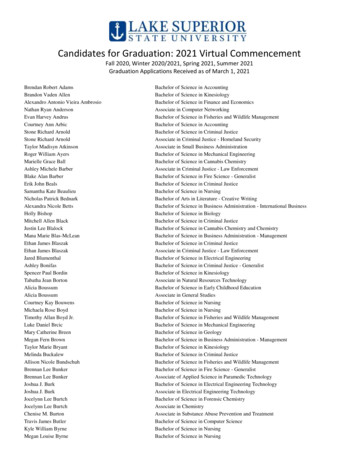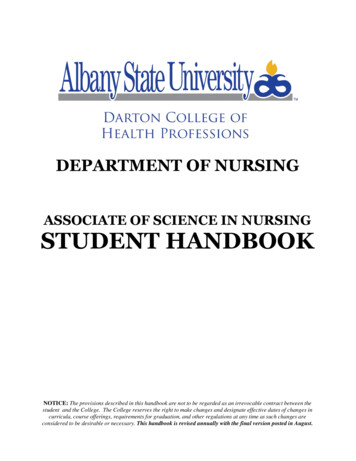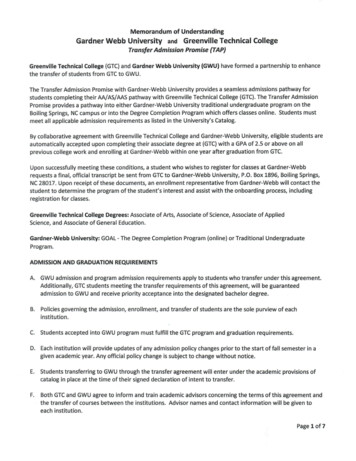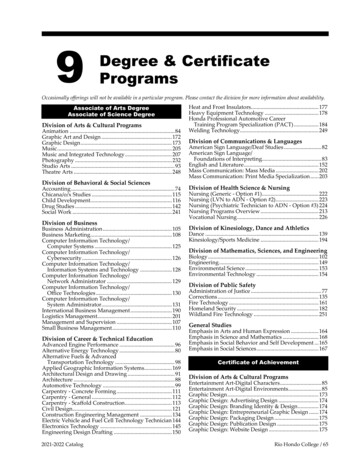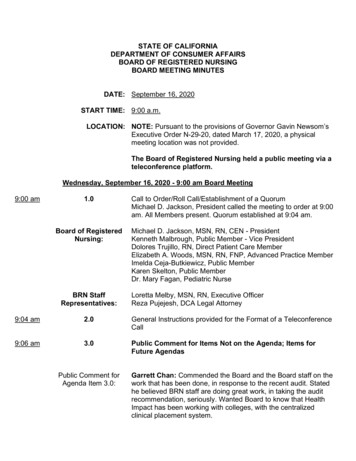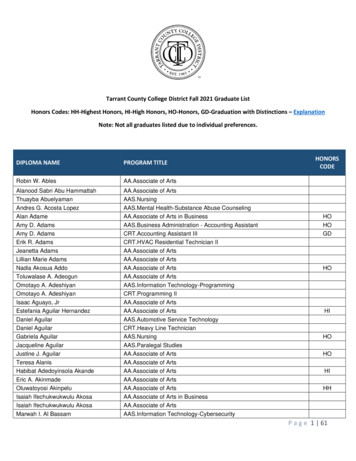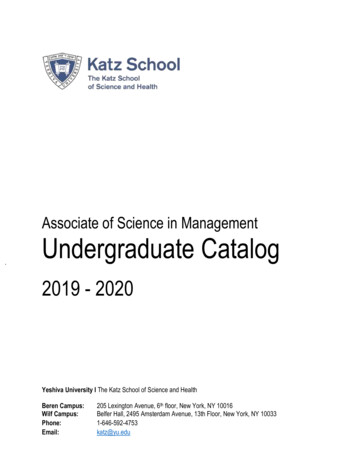
Transcription
Associate of Science in ManagementUndergraduate Catalog2019 - 2020Yeshiva University I The Katz School of Science and HealthBeren Campus:Wilf Campus:Phone:Email:205 Lexington Avenue, 6th floor, New York, NY 10016Belfer Hall, 2495 Amsterdam Avenue, 13th Floor, New York, NY 100331-646-592-4753katz@yu.edu
ABOUT THIS CATALOGThis catalog supersedes all previous catalogs and academic information and policies and is binding on all Associate of Science inManagement students at Yeshiva University, effective at the time they enroll. It was prepared on the basis of the best informationavailable at the time of publication. The university reserves the right to change tuition, fees, course offerings, regulations, andadmission and graduation requirements at any time without prior notice. However, students may continue a course of study in effectat the time they enrolled provided that no more than the normal period is taken to complete the program.This catalog, posted on the YU website, is the official catalog. Printed versions are copies of the catalog. If there are corrections orchanges, they will be published on the YU website as dated revisions indicating the changes from previous versions.
TABLE OF CONTENTSABOUT THIS CATALOG 1TABLE OF CONTENTS 2-3WELCOME TO THE KATZ SCHOOL 4ABOUT YESHIVA UNIVERSITY 5UNIVERSITY POLICIES 6-7 Equal OpportunityAccreditationSafety and SecurityNon-Discrimination and HarassmentAccommodations for Students with DisabilitiesStudent Conduct and Student RightsPrivacyUse of the University's NameASSOCIATE OF SCIENCE IN MANAGEMENT 8-13 Program OverviewProgram Director and AdviserDegree RequirementsCurriculum and Course RequirementsCourse DescriptionsUNDERGRADUATE JEWISH STUDIES 14-15 Beren Campus: Undergraduate Jewish StudiesWilf Campus: Undergraduate Torah StudiesACADEMIC POLICIES 16-22 Academic CalendarHousing RequirementAttendanceLate Admission and WithdrawalGradesExaminationsWorkloadClass StatusSatisfactory Progress StandardsDirected Study, Transfer Credits, and Courses from Outside InstitutionsDean's List and Latin HonorsLeaves of AbsenceWithdrawal from the UniversityAcademic Probation and DismissalDisciplinary Probation and DismissalRecords and TranscriptsExceptions to Academic PoliciesACADEMIC INTEGRITY POLICY 23-25 Cheating on Written Exams
PlagiarismPenalties and Procedures for Violating Academic Integrity StandardsOther Violations of Academic Integrity StandardsSTUDENT LIFE AND CAMPUS RESOURCES 26-30 Academic AdvisingAcademic ComputingAcademic Support (Wilf Campus)AthleticsCareer CenterCounseling CenterDining ServicesDisability ServicesHealth ServicesInternational Students and ScholarsLibrary ServicesMadrichot, Madrichim, and the Office of Spiritual GuidanceMashgichim and Mashgichim Ruchani’imOneCardShuttle ServicesStudent LifeStudy Center (Beren Campus)University Housing and Residence LifeADMISSIONS 31-33 Admissions RequirementsApplication ProceduresTypes of AdmissionCredit-Granting ExaminationsSTUDENT FINANCE 34-38 Tuition and FeesFinancial AidFinancial Assistance ProgramsDetermining Need for Financial AidPayment ProceduresWithdrawal Procedure and Refund PolicyConsequences of Being in ArrearsGLOSSARY OF ACADEMIC TERMINOLOGY 39-40GLOSSARY OF YESHIVA UNIVERSITY TERMINOLOGY 41-43
WELCOME TO THE KATZ SCHOOLThe Katz School of Science and Health at Yeshiva University gives students the opportunity to further their intellectual and professionalpursuits and become a part of one of U.S. News and World Report’s top 100 universities in the United States. The Katz School iscommitted to delivering a world-class education in emerging and expanding disciplines, to connecting students with thought-leadersand employers in New York City and beyond, and to creating an exemplary student and faculty experience.Our programs focus on Applied Sciences and Mathematics; Technology, Data, and Design; Health Sciences; and those emerging andexpanding professions that are being transformed by technology innovations. Graduate students can earn master's degrees inMarketing, Quantitative Economics, Mathematics, Enterprise Risk Management, or Speech-Language Pathology. In each of thesehighly specialized programs, the curriculum is informed by industry, providing our graduates with tools that will serve them well intotheir careers. Undergraduate students at The Katz School, whether part of an associate degree, summer session, or CollegeNOW,share in the same forward-looking college experience as our graduate students. They also join students at Yeshiva College, SternCollege, and the Sy Syms School of Business in the campus life that defines YU.An Exceptional EducationWhether on campus or online, courses are taught by an exceptional group of full-time and practitioner faculty, each committed to theprinciples of quality instruction. Unlike many professionally oriented schools, the faculty teach the science and strategies behind theskills, so that students have a knowledge base that will help them to thrive long after graduation.Rather than relying on tests and exams, courses are frequently project based, so that students are evaluated on what they build anddo. As a result, students graduate with a portfolio of work that will give them a competitive edge in the job market. Faculty also recognizethe critical role of technology in enabling digitally connected and data-rich organizations and therefore incorporate the latest softwareand lab equipment into their courses.An Experience that MattersWe challenge each of our students and faculty to lead with values—kindness, honesty, generosity, integrity, and justice towardsothers—and to leave the world a little better than they found it. We are committed to the belief that it is not only the destination thatcounts but the values we bring to the journey.Paul RussoVice Provost & Dean, The Katz School
ABOUT YESHIVA UNIVERSITYNow in its second century, Yeshiva University is the oldest and most comprehensive educational institution under Jewish auspices inAmerica. It is an independent university that ranks among the nation's leading academic research institutions and, reflecting the timehonored tradition of Torah Umadda, provides the highest quality Jewish and secular education of any Jewish university in the world.Since its inception the University has been dedicated to melding the ancient traditions of Jewish law and life with the heritage ofWestern civilization, and each year we celebrate as future leaders make YU their home.In September 2003, Richard M. Joel was inaugurated as Yeshiva University's fourth president, succeeding Norman Lamm, who hadheld the office since 1976. President Joel's two other predecessors were Bernard Revel, president from 1915 to 1940,and Samuel Belkin, who served from 1943 to 1975. Ari Berman was elected the fifth president of YU in November 2016 and tookoffice in June 2017.Visit the following website for more information about Yeshiva University: https://www.yu.edu
UNIVERSITY POLICIESEqual OpportunityYeshiva University is committed to a policy of equal opportunity and nondiscrimination in admissions and all other facets of itseducational programs and activities. The responsibility for the University’s affirmative action/equal opportunity and unlawfulharassment policy lies with all deans, chairpersons, department heads, directors, administrators, managers and supervisors in theirareas of responsibility and requires the commitment of the entire University community.If you have any questions relating to equal opportunity or affirmative action, or if you wish the University to pursue a possible violationof University policy, you should contact the University's Title IX Coordinator, Ms. Renee Coker at (646) 592-4336/ renee.coker@yu.edu.AccreditationYeshiva University is accredited by the Commission on Higher Education Middle States Association of Colleges and Schools and bythe appropriate professional agencies: the Liaison Committee on Medical Education of the American Medical Association, theAssociation of the American Medical Colleges, the American Psychological Association, the American Bar Association, theCommission on Accreditation of the Council on Social Work Education, the Association of Institutions of Higher Learning for JewishEducation and the National Board of License for Hebrew Teachers. The Master of Science program in Speech-Language Pathologyis a Candidate for Accreditation by the Council on Academic Accreditation in Audiology and Speech-Language Pathology (CAA) of theAmerican Speech-Language-Hearing Association.Safety and SecurityYeshiva University takes its responsibility for on-campus security very seriously and makes every effort to offer its students, facultyand staff a safe and comfortable environment by working closely with the local community and with law enforcement agencies. Eventhough there is a very low rate of crime on our campuses, federal law requires us to make crime statistics available. You can findthem at http://ope.ed.gov/security. Search for Yeshiva University, then click on a particular campus. At the bottom of each page, youcan select various categories of crime statistics to view. The University’s annual security report also contains policy statements andcrime statistics for the University, and is available online at http://yu.edu/safety- security/reports/security/ or from a campus SecurityDepartment office. You can also contact YU Security at 212-960-5221 for more information.While emergency events on campus are unlikely, it is vital to be prepared to react accordingly during emergencies to ensure yoursafety. To get prepared and learn about emergency response at Yeshiva University, visit our Emergency Readiness scrimination and HarassmentYeshiva University complies with all federal, state and local regulations governing Non-Discrimination and Harassment including TitleVII of the Civil Rights Act of 1964 and Title IX of the Education Amendments Act of 1972. In keeping with its long-standing traditionsand policies, Yeshiva University provides equal opportunity for faculty, staff and students within admissions and employment, andthose seeking access to programs on the basis of individual merit. The University does not discriminate in its programs and activities,including employment practices, on the basis of race, religion, creed, color, national origin, sex, age, disability, veteran or disabledveteran status, genetic predisposition/carrier status, marital status, sexual orientation, gender identity or citizenship status or otherprotected classes under the law.University-wide policies and procedures pertaining to discrimination and harassment have been established, both as a legalobligation under applicable law and as a visible and formal expression of institutional policy. The University’s Non- Discriminationand Anti-Harassment Policy and Complaint Procedures can be found online at http://yu.edu/student- life/resources-andservices/standards-policies/; http://yu.edu/hr/policies/ and http://yu.edu/ogc/policies/ (among other places). This policy includesinformation about filing a report, seeking a response and options for confidential disclosure. The University will respond to allcomplaints promptly, thoroughly, fairly and impartially. Retaliation is prohibited against anyone who filed and/or participated in theinvestigation of a complaint, even if the complaint is unsubstantiated. When warranted, the University will take appropriate, correctiveaction to remedy all violations of this policy, up to and including termination and/or expulsion.
Administrative and investigative responsibility relating to enforcement of the policy has been assigned to the University's Title IXCoordinator, Ms. Renee Coker at (646) 592-4336 / renee.coker@yu.edu.Accommodations for Students with DisabilitiesThe Office of Disability Services assists students with documented disabilities or medical conditions in obtaining reasonableaccommodations. Some of the disabilities accommodated include physical, emotional, learning disabilities, ADHD, hearingimpairments, and visual impairments. Visit the following website for more information about documentation guidelines and availableaccommodations: ices/disability-services/students.Students who wish to request accommodations for a documented disability that affects his/her academic performance and studentswho suspect that they may have a disability are encouraged to contact the Office of Disability Services: Beren Campus: Rochelle Kohn, (646) 592-4132 / rkohn1@yu.edu Wilf Campus: Abigail Kelsen, (646) 592-4280 / akelsen@yu.eduStudent Conduct and Student RightsPlease visit ices/Standards-Policies and review the following University policies onstudent conduct and student rights: Athlete Protection Policy Anti-Bullying and Hazing Policy for Students Credit Card Marketing Policy Drug and Alcohol Policy Medical Form Requirements for Working with Minors Romantic Relationships Policy Sexual Assault Student Bill of Rights Title IX (Non-Discrimination and Anti-Harassment Policy)Additional student consumer information can be found at: n.PrivacyIn accordance with the provisions of the Family Educational Rights and Privacy Act of 1974, as amended (Section 438 of the GeneralEducational Provisions Act, 20 USC 1232g), also known as “FERPA,” Yeshiva University has adopted certain policies to protect theprivacy rights of its students with respect to their education records. FERPA affords students certain rights of access to their educationrecords. FERPA also limits the persons to whom the University may disclose a student’s education records and permits certaindisclosure without the student’s written permission. Please visit the Office of the Registrar or its website athttps://www.yu.edu/registrar/parents to obtain the Yeshiva University FERPA Policy Statement.Use of the University’s NameNo student or student organization may use the name of the University or any of its components in print or digital/electronic media forany purpose, including identification, without written permission from the Office of the Dean.
ASSOCIATE OF SCIENCE IN MANAGEMENTProgram OverviewThe Associate of Science (AS) in Management offers students the best of Yeshiva University—a rigorous Jewish and businesseducation combined with our distinctive on-campus experience. As a result of a carefully planned curriculum, students gain the skillsand knowledge needed to succeed in a data-rich, digitally-connected global business environment. Upon graduation, students will beprepared to continue their education at the Bachelor’s level or to pursue professional opportunities. As part of the AS in Management,students enroll in YU’s dual-curriculum; students take a full Jewish studies program in addition to their management courses. Jewishtradition provides the framework for consideration of ethical issues, an integral part of the University’s curriculum.Students are taught by distinguished faculty who hold positions in research and professional communities and offer students a thoroughbackground in the theoretical and practical aspects of management. Students hail from a wide geographic area. As a result, studentshave an opportunity to broaden their knowledge of, and sensitivity to, other cultures—an experience that will help them better understandand thrive in an ever-growing global environment.Men attend the program at the uptown Wilf Campus. Women attend the program at the Beren Campus in midtown Manhattan.Program Director and AdviserDr. Jessica Accurso-Salguero– Program Director, AS in Managementj.accurso-salguero@yu.eduSimon Jaffe – Adviser, AS in Managementsimon.jaffe@yu.edu / (212) 960-5400 ext. 5895DegreeRequirementsCourse and Credit RequirementStudents must complete a minimum of 60 credits, including all major and degree requirements as well as the required JewishStudies courses.Residence RequirementStudents must successfully complete at least 54 degree credits in the AS in Management program at Yeshiva University, withno more than 6 outside credits applied to courses in the program of study.Grade RequirementStudents must achieve a 2.000 or higher as their cumulative grade point average for all courses taken at Yeshiva University aspart of the AS in Management degree. Students must achieve a C- or higher in each course taken as part of the AS degree. See“Grades” section for additional informationAdministrative RequirementsEach student must receive approbation of the faculty and the president, and must have filed an Application for Graduation formduring the registration period of the semester in which the student completes all requirements.GraduationAS in Management graduates participate (“walk”) in the undergraduate Commencement Exercises which take place annually inMay. However, the AS degree is conferred in September, after students complete their second-year summer courses. Agraduation celebration for AS students takes place in August or September.Transfer to Bachelor’s DegreeUpon successful graduation from the AS program, students who graduate with a GPA of 3.0 or higher will have the opportunityto enroll in the Bachelor of Science in Business and Management at the Sy Syms School of Business. Students may also applyto other bachelor’s programs at YU and are encouraged to speak to their adviser for more details.
Curriculum and Course RequirementsThe AS in Management integrates traditional business disciplines such as management, accounting and human resources withemerging fields, including data science and information systems. The imaginative College Experience courses employ a project- basedcurriculum, where students will learn by doing. Ideas will be brought to life, using New York City as a classroom. The program is 2 yearslong and includes 2 fall semesters, 2 spring semesters, and 2 summer semesters.Course RequirementsThe following courses are required for the AS in Management degree:I. Communication (3 courses / 9 credits) FYWR 1020 First Year Writing (3 credits) FYSM 1012 Business Communication (3 credits) SPEE 1010 Speech Communication (3 credits)II. Quantitative Reasoning (4 courses / 12 credits) IDS 1001 Business Algebra (3 credits) IDS 1131 Statistics for Business (3 credits) IDS 1020 Introduction to Information Systems (3 credits) IDS 1540 Introduction to Data Science (3 credits)III. Economics (2 courses / 6 credits) ECO 1031 Microeconomics (3 credits) ECO 1041 Macroeconomics (3 credits)IV. Business (5 courses / 15 credits) MAN 1020 Principles of Strategy (3 credits) MAN 1030 Intro to Business (3 credits) MAN 2110 Organization Behavior (3 credits) MAN 2370 Human Resources (3 credits) BLW 2021 Ethical & Legal Environments of Business (3 credits)V. Accounting (2 courses / 6 credits) ACC 1003 Foundations of Financial Accounting I (3 credits) ACC 1004 Foundations of Financial Accounting II (3 credits)VI. College Experience (4 courses / 4 credits) INDS 1210 College Experience: The City’s Impact on the Global Stage (1 credit) INDS 1160 College Experience: Work as A Place for Ideation, Incubation and Innovation (1 credit) INDS 2170 College Experience: Cultural, Artistic, and Intellectual Traditions (1 credit) INDS 2660 College Experience: Your Story: Praxis and Reflection (1 credit)VII. Jewish Studies (4 semesters / credits vary)Each fall and spring semester, AS students participate in the University’s undergraduate Jewish Studies programs.AS students on the Wilf Campus enroll in the Undergraduate Torah Studies program at Rabbi Isaac Elchanan Theological Seminary(RIETS). AS students on the Beren Campus enroll in the Jewish Studies program through the Rebecca Ivry Department of JewishStudies at Stern College for Women. Within their Jewish Studies programs, all AS students must complete: 2 semesters of Hebrew language (or equivalent exemption) (6 credits) JVCW 1001 Jewish Engagements (or approved equivalent) (2 credits)For more information on Jewish Studies requirements, see pages 14-15.
Example of Possible Course SequenceThe AS in Management is a cohort-based program, which means that all AS students enroll in the same courses each semester– with the exception of Jewish Studies.Subject AreaFall 1Spring 1CommunicationFYWR 1020First YearWritingFYSM 1012BusinessCommunicationQuantitativeIDS 1001BusinessAlgebraIDS 1131Statistics forBusinessBusinessMAN 1020Principles ofStrategyMAN 1030IntroductionBusinessEconomicsSummer 1Fall 2MAN 2370HumanResourcesECO 1041MacroeconomicsAccountingACC 1003Foundations ofFinancialAccounting ICollegeExperience 1Jewish StudiesIDS 1540Introduction toData ScienceBLW 2021 Ethical & MAN 2110Legal Environment OrganizationalBehaviorof BusinessECO 1031MicroeconomicsCollege Experience INDS 1210INDS 1160CollegeExperience 2Summer 2SPEE 1010SpeechCommunicationIDS 1020Introduction toInformationSystemstoSpring 2INDS 2170CollegeExperience 3ACC 1004Foundations ofFinancialAccounting IIINDS 2660CollegeExperience 4AS in Management students register for Jewish Studies courses every Fall and Spring semester. See pages 14-15 for additional informationon Jewish Studies requirements.
Course DescriptionsACC 1003 Foundations of Financial Accounting ICompanies track their finances and communicate their performance to outsiders according to general accepted accounting principles(GAAP). The course is designed to provide an understanding of financial accounting fundamentals for prospective users managers.Students will develop entry-level skills for segmenting, recording, and reporting basic financial data. They will also develop basictechnical skills needed to analyze financial statement. Prerequisite: IDS 1001ACC 1004 Foundations of Financial Accounting IIThis course builds on the understanding and skills related to recording, adjusting, and completing the accounting cycle to help studentsmaster the remaining technical skills needed to analyze and prepare financial statements and disclosures including balance sheets andthe related assets, liabilities, and equity calculations; a primer on corporate tax issues; investment income reporting; cash flow; andbasic costing. Prerequisite: ACC 1003.BLW 2021 Ethical & Legal Environment of BusinessSubstantive law and practical issues as they relate to business; theories of jurisprudence; business ethics and Halakhah as they interfacewith the law and practical business decisions; the legal process; federal and state court systems; alternative dispute resolution;constitutional law; administrative agencies; criminal law and procedure; torts; products liability; contracts.MAN 1030 Introduction to BusinessGoing beyond a conceptual understanding of what businesses do, we take a practical approach to business from the perspective ofthe “founder.” An Introduction to Business focuses on starting, financing, marketing, and managing businesses in a digitallyinterconnected, globally distributed economy. Students learn businesses from a holistic and enterprise-wide perspective, and as ajumping off point to specialize in one of a number of vertical markets. Given its place in the world’s economy, we use New York Cityas our lab for learning best practices in successful businesses and invaluable lessons from failed ones. Prerequisite: IDS 1001.INDS 1210 College Experience: The City’s Impact on the Global StageIn this course, students develop a deep understanding of the centrality and leadership role that New York City—home to immigrantsand native born internationals—plays in global commerce, international policy, technology innovations, and current events. This firstsemester experience integrates and expands upon topics covered in three of the required first semester courses in the AS inManagement: Introduction to Business, Business Algebra, and First Year Writing.INDS 1160 College Experience: Work as A Place for Ideation, Incubation and InnovationThis second semester experience course looks at New York City as a center for business ideation, incubation and innovation. Studentsexamine New York City’s start up economy and consider its social and financial impacts. As part of the incubation theme, theexperience leverages lessons from Introduction to Information Systems. This course also incorporates earlier themes from semester1’s Introduction to Business and First Year Writing courses and extends students quantitative skills along with Business Statistics forthe current term. The experience requires multiple field trips to several of NYC’s incubators and startup communities.INDS 2170 College Experience: Cultural, Artistic, and Intellectual TraditionsIn the third semester, students explore New York City’s deep connection and contribution to the world's cultural, artistic, and intellectualmores. This course incorporates field trips and guest speakers from the City’s major and obscure museums and cultural organizationsas a way of exposing students to mainstream and provocative points of view. Tapping into the third semester course on JewishEngagement, this college experience course also includes an examination of the rich contribution of Jews to cultural, artistic, andintellectual traditions.INDS 2660 College Experience: Your Story: Praxis and ReflectionThe fourth college experience course challenges students to reflect on, reimagine, and ready themselves as emerging collegestudents, community members, and professionals. Through research, planning, and multimodal, autobiographical writing, studentsreflect on their academic and professional development—both successes and challenges—in order to clarify strengths, weaknesses,goals, and future plans. The self-reflective nature of this experience asks students to identify and engage with specific artifacts,institutions, and individuals that have influenced their growth. The course also asks students to consider how Judaism and Jewishculture have influenced their academic, personal and professional goals and identities. Prerequisite: 3 College Experience Courses.
ECO 1031 Introductory Economics I: MicroIntroduction to microeconomic analysis: supply and demand, the behavior of firms and consumers; how markets work; market failures;policy issues such as taxation regulations, and redistribution of income.ECO 1041 Introductory Economics II: MacroIntroduction to macroeconomic analysis: General equilibrium, business cycles, inflation, unemployment; national income accounting;monetary policy and the financial system, fiscal policy and social insurance; theories of international trade; long-term growth.Prerequisite: ECO 1031.FYSM 1012 Business CommunicationThis course seeks to develop skills that are important keys to success within many if not all chosen professions. All interactions inbusiness require communications skills, whether written or oral, whether in large groups or small groups. It is especially important forstudents contemplating careers in business to develop communications skills that will enhance their career development and success.Prerequisite: FYWR 1020.FYWR 1020 First Year WritingFirst Year Writing introduces students to college-level writing and prepares them for other academic work by deepening readingcomprehension and critical thinking skills. This course emphasizes the writing process so that students can develop strategies forinvention, exploration, and revision. First Year Writing encourages rhetorical flexibility and helps students integrate and build onsources in order to consider topics from different viewpoints, gain more knowledge, and learn how to cite others’ words and ideasaccording to academic documentation practices.IDS 1001 Business AlgebraThis course provides a review of computational and problem-solving skills. Included is a presentation of a broad scope of fundamentalmathematical concepts in applied mathematics relevant to accounting, finance, management, and marketing, with examples drawn fromdifferent business disciplines.IDS 1131 Statistics for BusinessThis course includes modern statistical methods as a basis for decision making. Topics include fundamentals of probability, discreteand continuous distributions, descriptive statistics, and inferential statistics. Prerequisite: IDS 1001.IDS 1020 Introduction to Information SystemsThis course provides the background necessary to make decisions about computer-based information systems and to be an enduser. The course includes hands-on experience with personal computers and information systems management. Groups andindividual computer assignments expose students to electronic spreadsheet analysis and database management on a personalcomputer. Management aspects focus on understanding computer technology, systems analysis and design, and control ofinformation processing by managers. Prerequisite: 1DS 1001.MAN 2110 Introduction to Data ScienceThis course introduces basic concepts and applications of analytics. Topics include an overview of the analytical process and the roleof the analyst, applied descriptive statistics, exploratory data analysis, data visualization, reporting, and data driven storytelling.Students will apply these analytic tools to social and organizational issues, for creating insights and solving problems. Prerequisites:IDS 1131, IDS 1020, ECO 1031.MAN 1020 Principles of StrategyThis course focuses on the development of the skills and knowledge required for successful managerial performance in today's globalenvironment. With an emphasis on self-assessment and application, this course provides an in-depth examination and practice of thecore managerial competencies. Topics covered include problem solving, communication, empowerment and motivation, managingconflict, power and influence, and performance improvement. A major learning objective is to recognize the relati
Associate of Science in Management Undergraduate Catalog 2019 - 2020 Yeshiva University I The Katz School of Science and Health Beren Campus: 205 Lexington Avenue, 6th floor, New York, NY 10016 Wilf Campus: Belfer Hall, 2495 Amsterdam Avenue, 13th Floor, New York, NY 10033 Phone: 1-646-592-4753 Email: katz@yu.edu
